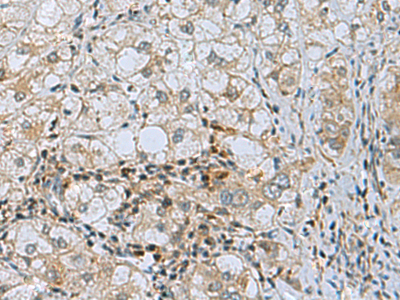
Size:100 μl
Price:$ 349
Brand:NewEast  Place of Origin:USA
Immunogen:
Place of Origin:USA
Immunogen:
| Cat.#: S210089 | ||||
| Product Name: Anti-BCL2L15 Rabbit Polyclonal Antibody | ||||
| Synonyms: Bfk; C1orf178 | ||||
| UNIPROT ID: Q5TBC7 (Gene Accession - BC127719 ) | ||||
| Background: Proteins of the Bcl-2 family are critical regulators of apoptosis. Proapoptotic members, like Ba,x contain three of the four Bcl-2 homology regions (BH1-3), while BH3-only proteins, like Bim, possess only the short BH3 motif. Database searches revealed Bfk, an unusual novel member of the Bcl-2 family that contains a BH2 and BH3 region but not BH1 or BH4. Bfk is thus most closely related to Bcl-G(L). It lacks a C-terminal membrane anchor and is cytosolic. Enforced expression of Bfk weakly promoted apoptosis and antagonized Bcl-2's prosurvival function. Like Bcl-G(L), Bfk did not bind to any Bcl-2 family members, even though its BH3 motif can mediate association with prosurvival proteins. Low amounts of Bfk were found in stomach, ovary, bone marrow and spleen, but its level in the mammary gland rose markedly during pregnancy, suggesting that Bfk may play a role in mammary development. | ||||
| Immunogen: Fusion protein of human BCL2L15 | ||||
| Applications: ELISA, WB, IHC | ||||
| Recommended Dilutions: IHC: 50-200;WB: 500-2000;ELISA: 5000-10000 | ||||
| Host Species: Rabbit | ||||
| Clonality: Rabbit Polyclonal | ||||
| Isotype: Immunogen-specific rabbit IgG | ||||
| Purification: Antigen affinity purification | ||||
| Species Reactivity: Human, Mouse | ||||
| Constituents: PBS (without Mg2+ and Ca2+), pH 7.4, 150 mM NaCl, 0.05% Sodium Azide and 40% glycerol | ||||
| Research Areas: Cancer | ||||
| Storage & Shipping: Store at -20°C. Avoid repeated freezing and thawing | ||||
|
Select By Alphabet
A B C D E F G H I J K L M N O P Q R S T U V W X Y Z
Subscribe to our latest email
(+1) 610-945-2007 [email protected] [email protected] 840 First Avenue, Suite 400, King of Prussia, PA 19406
Copyright © 2010 - 2024 NewEast Biosciences | All rights reserved
Bioactive Transmembrane Proteins Antibodies for Transmembrane Proteins G Protein | GTPase




 Add to cart
Add to cart
 Download
Download





